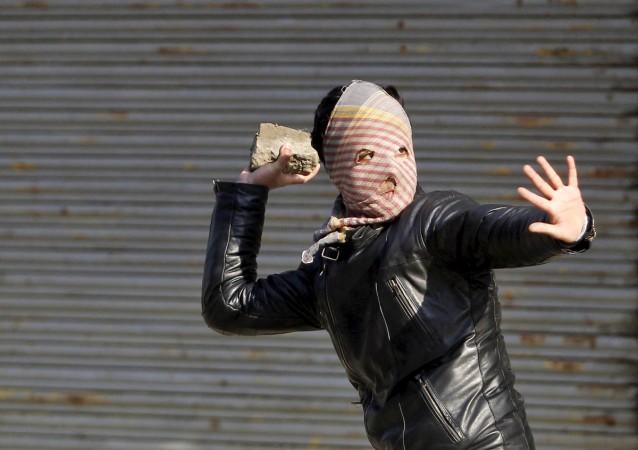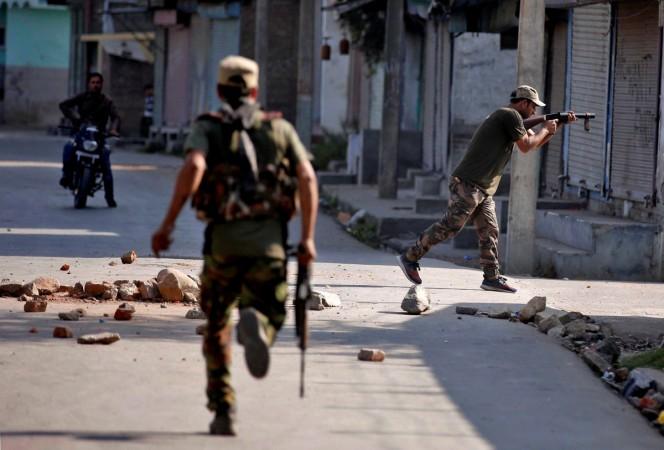
The Supreme Court on Friday, April 28, said that incidents of stone pelting had to stop for peace talks to continue in Jammu and Kashmir. The apex court said that students need to stop pelting stones at security forces and return to schools and colleges for a resolution to be initiated in the Valley.
The court also asked the Centre to facilitate talks between separatists and influential public voices in an attempt to reduce tension in the area, where over 100 people have died in violent clashes that have been going on since last year.
A bench, led by Chief Justice of India JS Khehar and also comprising Justices DY Chandrachud and Sanjay Kishan Kaul, said that it would be appropriate if "both sides take two steps back" and "address core issues" in the state. "If you keep throwing stones, and close schools and colleges, how will talks happen? You first talk. But if you are suggesting secession, nothing will happen. Talks have to be within the framework of the Constitution," the bench said.
Justice Kaul added that education would empower the students and deliver them from widespread unemployment and anger that has been spilling out on the streets. The bench also said that "one cannot clap without both hands." The bench added that it could issue a few orders, like suspension of the use of pellet guns by the security forces, if the Jammu and Kashmir Bar Association was able to ensure that no violent protests would take place and no harm would be caused to anyone through stone-pelting.

However, the Jammu and Kashmir Bar Association countered what the bench said, stating that security forces entered schools and universities and thrashed students. "If they beat up the students, students will be on the streets. Throwing of stones is a reaction. The Centre has stopped talking to the people of Kashmir. The people want uninterrupted, unconditional and sincere dialogue," the Bar's lawyer told the apex court.
The bench told the representatives of the Bar Association to use their influence to initiate dialogue with separatist Hurriyat leaders, in what could be the "first step to bring normalcy" in Kashmir. However, the central government ruled out the option of engaging in dialogue with Hurriyat leaders, who are the political face of the anti-India movement and have been raising issues of "Azadi" and "accession" in the Valley.
"The Centre is aware of the situation there and is taking all the measures," Attorney General Mukul Rohatgi, who represented the Centre, told the court, raising strong objections to the bar association's argument that the Centre should hold "unconditional talks with the jailed Hurriyat leaders." He added that the central government would speak only with the legally recognised stakeholders and not with those who believe that elections are state terrorism.

"The government would come to the negotiation table only if legally recognised stakeholders participate in the dialogue and not with the separatist elements who rake up the issue of accession or Azadi in Kashmir," Rohatgi said. "What is going on? Bar is talking about Geelani and separatists? They have said it ten times while arguing that we should release them. I am making it very clear that the government would absolutely not entertain into any talks of 'Azadi' with these leaders," the attorney general added.
When asked what could be done to bring peace in Kashmir, Rohatgi said that security forces could not be withdrawn because national security was at stake at the border. He also disagreed with the bar association for calling Jammu and Kashmir's accession to India "controversial" and elections in the state "rigged", the Indian Express reported.
The bench then asked the Jammu and Kashmir Bar Association to suggest as to who could have a dialogue with stakeholders in the violence-hit state. The apex court also asked the Centre to figure out a way forward in the matter. "This is (going to create) history. You can play a role and you will be remembered for times to come," the bench told the lawyer, who represented the bar association.
The next date of hearing is scheduled to be held on May 9, 2017.

















